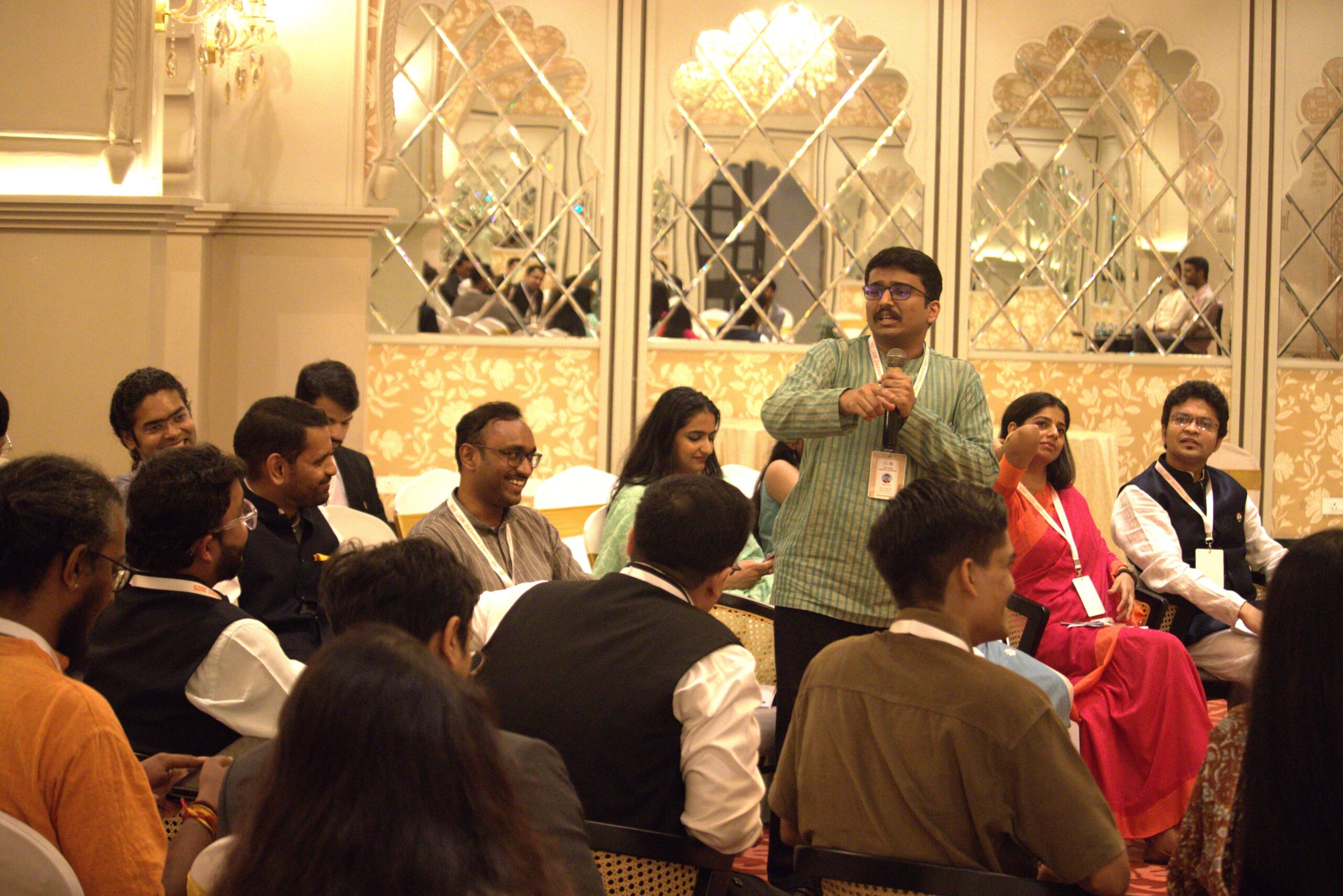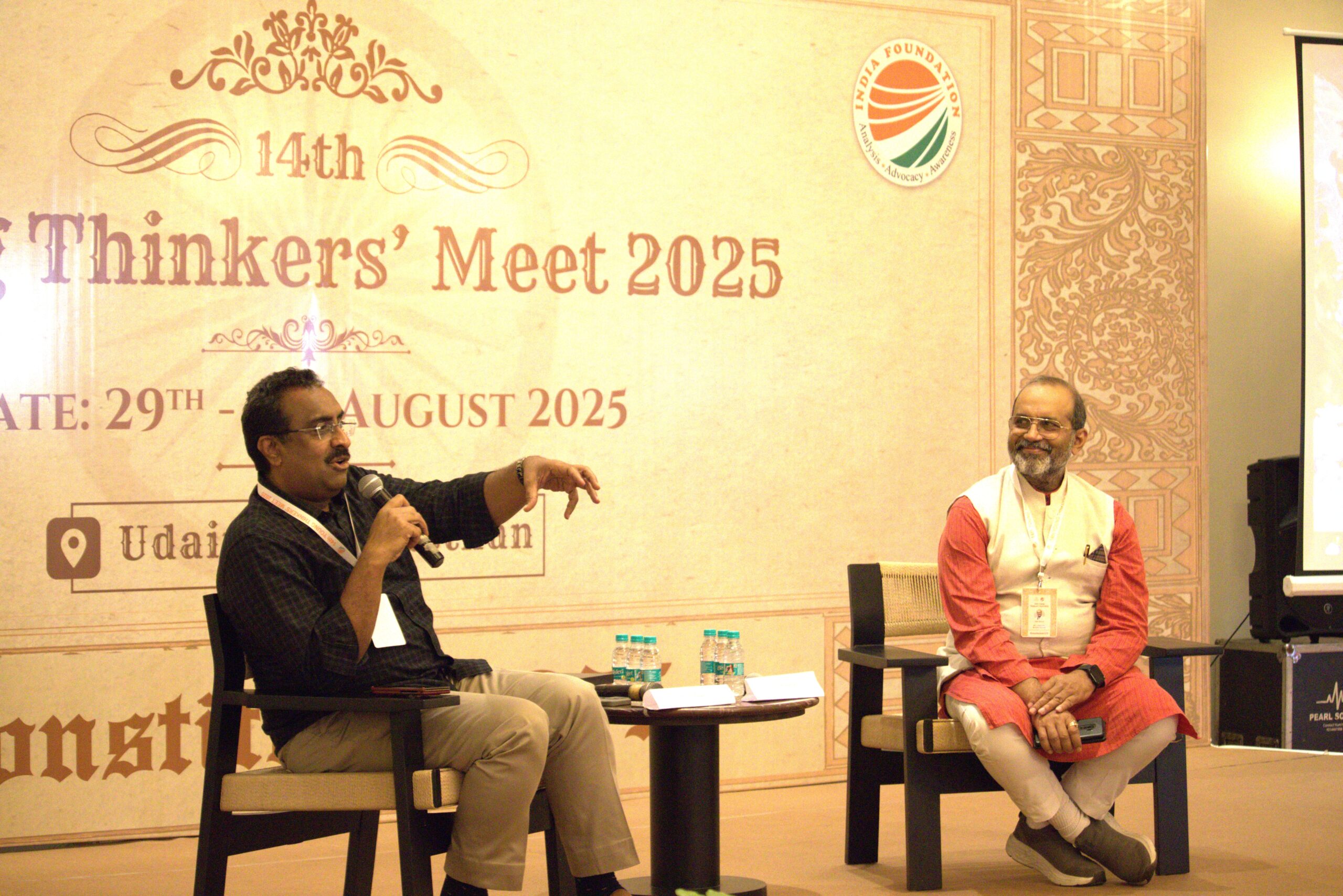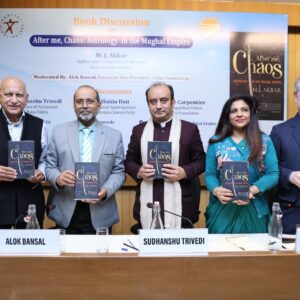The 14th edition of Young Thinkers’ Meet was held at Udaipur, Rajasthan from 29 Aug to 31 Aug 2025. Young Thinkers’ Meet (YTM) is an initiative of the India Foundation that began its journey in 2012 at Coorg, Karnataka. The annually held event acts as a confluence of young nationalistic minds hailing from varied walks of life across India. YTM, today, has an alumni base of over 600 individuals who belong to different parts of India and come with unique life experiences and skill-sets. There are social activists, political activists, NGO workers, academics, journalists, scientists, corporate professionals and students from reputed national and international universities. Participants in the YTM come from all parts of the country and indulge themselves in deliberations and debates on issues of contemporary national importance. The format of the meet is immersive and experiential rather than a lecture-based classroom format. The number of delegates at any YTM has varied from seventy-five to eighty-five and involves freewheeling discussion over two to three days. Each year, YTM moves to a new location and helps the young delegates explore the incredible diversity of the country. The meet has previously happened in Chitrakote, Bastar, Chhattisgarh; Guwahati, Assam; Coorg, Karnataka; Manesar, Haryana; Pune, Maharashtra; Pachmarhi, Madhya Pradesh; Patnitop, Jammu & Kashmir; Vadodara, Gujarat; Kasauli, Himachal Pradesh; Chilika, Odisha; Pahalgam and Srinagar, Jammu & Kashmir; and Annavaram, Andhra Pradesh. Due to the national lockdown, YTM happened virtually in 2020.

Picture 1: Group Photograph (For Header)
Marking the 75th anniversary of the adoption of the Indian Constitution, the 14th YTM was based on the theme, ‘Constitution@75’. There was involvement of 53 delegates and 9 mentors with people from 18 states and 2 union territories. The average age of the delegates ranged between 25 and 35 years. A few delegates also engaged in book discussions and shared personal anecdotes, enriching the deliberations with diverse perspectives. They also had the opportunity to visit the Maharana Pratap Gaurav Kendra, Udaipur.
On 29 August 2025, the introductory session was led by Capt. Alok Bansal, Executive Vice President, India Foundation. He welcomed the participants and encouraged the delegates to introduce themselves. After this, the first panel discussion was on the theme, ‘Synergy or Strain? Legislature, Executive and Judiciary in the Indian Constitution’, moderated by Capt. Alok Bansal. The keynote speaker of this session was Dr. Swapan Dasgupta, Distinguished Fellow, India Foundation, while there were 5 discussants from among the delegates. The panel explored the importance of keeping a balance of power among the different constitutional institutions and risks of judicial overreach. The discussants brought in the matters of executive inaction, judicial activism, gaps in accountability, the role of the legislatures, and reforms in politically sensitive areas.
After dinner, the delegates participated in the Mock Parliament exercise chaired by Dr. Jigar Inamdar, Visiting Fellow, India Foundation. The delegates were divided into ruling party and opposition. The motion for debate was, ‘75 years of the Indian Constitution’.

Picture 2: Mock Parliament
The following day started with the Inaugural Session, ‘Constitution@ 75’, chaired by Shri Shaurya Doval, Member of the Governing Council, India Foundation. The key-note speakers for the session were Shri Dattatreya Hosabale, Sarkaryavah, Rashtriya Swayamsevak Sangh and Col. (Retd.) Rajyavardhan Singh Rathore, Cabinet Minister, Government of Rajasthan.
The session discussed the importance of India’s Constitution in its 75th anniversary and reminded that many young leaders had contributed to its making. The youth were urged to take this legacy forward by strengthening democracy and national life, emphasizing that the Constitution lives through the people who uphold it. The proceedings also delved on citizens’ responsibility, the efficiency of governance, and the use of education and technology for empowering India’s youth to rise beyond caste and vote-bank politics.

Picture 3: Inaugural Session
The second panel discussion revolved around the theme, ‘Affirmative Action Revisited: The Sub-categorisation Debate and the Future of Social Justice’, with Dr Guru Prakash, Assistant Professor of Law, Patna University, and Shri Sudarshan Ramabadran, a policy analyst and author, as key-note speakers. This session included 6 discussants. The session’s participants focused on the evolution of affirmative action along with the Rohini Commission’s work and the dual challenge of effective distribution of benefits among the OBC and SC communities. The conversation brought out the value of well-balanced, socially equitable, and data-driven reform that is also inclusive and constitutionally appropriate.
This was followed by a workshop on ‘Cases that Shaped Indian Polity’, curated by Dr. Raghav Pandey, Assistant Professor, NLU Delhi and Shri Apurv Kumar Mishra, Consultant, EAC–PM. The workshop touched upon important judicial and constitutional polities, like the abuse of Article 356, judicial review as a check on executive overreach, and the widening of the interpretation of the right to life. The workshop also focused on electoral reforms and the judiciary’s role in enhancing democratic accountability.

Picture 4: Workshop
After the workshop, a session titled, ‘What is Basic to the Indian Constitution?’, was held, with Shri Vikramjit Banerjee, Additional Solicitor General of India (Supreme Court) as the key-note speaker; there were 5 discussants from among the delegates. The session explored the key amendments and milestones that shaped the Indian Constitution’s journey, including the Government of India Acts, the Nehru Report, and the Constituent Assembly debates. The panellists explored the attempts to solve the problems of integrating more than 560 princely states and addressing the challenges posed by colonial and indigenous heritage. The session highlighted the constitution’s flexibility, its nature as a living document, and its remarkable impact as a model for post-colonial democracies in Asia and Africa.

Figure 5: Session on ‘What is Basic to the Indian Constitution’?
Dr Ram Madhav, President, India Foundation, conducted a fireside chat with the delegates. The conversation looked back on the evolution of India’s Constitution—from the initial drafts such as the Motilal Nehru Report, 1928, to the debates in the Constituent Assembly, underscoring the Indian essence of the Constitution and its ability to function as a living document. The remarkable achievements of democratic integration of the diverse regions and princely states were highlighted, which became the bedrock of India’s democracy.

Picture 6: Fireside Chat
On the final day, the conference moved to a session titled, ‘The Indian Constitution in a Comparative Perspective’, with Dr A. Surya Prakash, Member, Prime Ministers Museum and Library Society, as a keynote speaker. The session highlighted the shortcomings of indices developed in Western democracies, such as V-Dem and Freedom House, from an Indian perspective, comparing them to the Indian constitutional provisions of equality, liberty, and minority protections. The need for a uniquely ‘Indian index of democracy’, originating from the civilisational ethos of Bharat.
The YTM featured a simulation exercise on ‘One Nation, One Election’, in which groups took on the roles of Parliament, the Judiciary, State Governments, Civil Services, the Media, Civil Society, and the Election Commission. They shared their views on the opportunities and challenges of simultaneous elections from the perspective of the body they represented.
Dr. Ram Madhav presided over the Valedictory Session. The assembled delegates concurred that after 75 years, the challenge is to safeguard the spirit of the Constitution and reconcile it with new aspirations. The session underlined the Constitution as a living document, noting, however, the need for it to be grounded in India’s civilizational ethos. Delegates also spoke about how YTM offered them a hands-on experience to dive deep into constitutional issues, a stage to share insights from different parts of the state, and a community of young committed nation builders.

Picture 7: Valedictory Session



